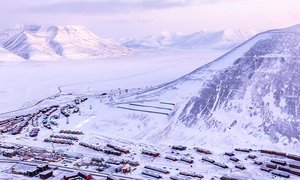By Hans J. Marter
Since the first oil was pumped ashore, on the 25th November, 1978, from the new oil fields in the East Shetland Basin, almost 7.5 billion barrels of crude have been exported from the four loading jetties at the terminal, 30 miles to the north of Lerwick.
Shetland?s involvement with the oil industry has created a prosperous society that enjoys one of the highest standards of living anywhere in Britain.
A unique partnership between the industry and the local authority has secured the islands a steady stream of income, which is used to boost the economy and to finance amenities other local authorities in Britain can only dream of.
With the massive Clair oil field, 50 miles to the west of Shetland, coming on stream towards the end of next year, the BP led management at the oil terminal is confident that Sullom Voe will be producing oil for another 25 years.
Combined with potentially huge developments in the renewable energy generation sector likely to be materialising during the next few years, Shetland will continue to play a major role in the UK?s energy provision.
While most of the population feels comfortable with the major industrial development taking place in one of the UK?s remotest and rural communities, it is worth noting that when oil was first found in the northern North Sea, some 30 years ago, many Shetlanders were not keen to seen the industry arriving.
Shetlanders had been living a certain lifestyle for many years. Virtually unchanged for centuries, the islands enjoyed a life deeply rooted in its heritage, but also enjoying a limited prosperity based on fishing, fish processing, agriculture and knitting. Many people felt that there was no need for the drastic changes that were inevitably coming.
Journalist and book author Dr Jonathan Wills is one the many islanders who followed closely the arrival of oil in Shetland. He said there was a widespread fear of environmental damage and cultural intrusion, but, fortunately, neither happened.
?People thought the oil industry would make a mess of the environment. But the industry had some bad publicity earlier, so they behaved themselves.
?They also thought they would be culturally swamped, but in fact it led to a renaissance of dialect writing. Artists suddenly got a market for their products they never had,? he said.
And, of course, there were many new and well paid jobs around. Barbara Fraser, of Gulberwick, said oil arrived just when her children were growing up. ?There were no difficulties in finding a job at that time and that was just great when my kids were leaving school.?
Unique deal
Council convener Sandy Cluness was involved in the negotiations with the oil industry from day one; first as a solicitor and then, from 1973 as an elected member of the Zetland County Council. He said that people quickly realised that oil was to come anyhow, as Shetland was the nearest landfall, and that it was important to get the best deal possible.
He said: ?Nobody was particular keen to have oil here because we had lived a certain kind of lifestyle for many years and oil seemed to be too disruptive to be good for us.?
However, the debate in the islands quickly focussed on whether the oil harbour and the ground the terminal stands on should be in public or in private ownership, he said
?Eventually we realised that oil was going to come anyhow, and the more we could control and be part of the development, the more money we could keep in the community and create the facilities for the future.?
Subsequently, the council?s representatives managed successfully to make their case to the UK government in London, which resulted in the Zetland County Council Act 1974, a unique piece of UK legislation that gave the islands the control over its waters and led to the present set-up in which the council runs the terminal?s harbour, ensuring high environmental standards, but also drawing an income for the good of the whole community. The local authority was also enabled to buy and own the land designated to house Europe?s largest oil terminal by compulsory purchase.
Construction at the site began soon afterwards and within a short period of time the whole area between the villages of Brae and Mossbank was turned into a huge building site that employed around 6,000 people, mainly men.
BP employee Nick Cope arrived in Shetland in February 1978 when construction work was at its peak. Originally from Dover, he has made Shetland his home and has been employed at the terminal for the last 25 years.
He said: ?There was a great buzz about the place back in 1978. When I arrived first there was a lot of construction work going on; such as earth moving, civil construction work, laying the foundations for a lot of the constructions that came on site in later years.
?There were probably about 5,000 to 6,000 bears ? construction workers ? who were working on the site and they lived in construction camps and had to be bussed in every day. It was quite a cosmopolitan mixture here, there were people from Wales, Ireland, and also many locals worked here. It was a great opportunity for them.?
First oil was pumped through two pipelines in November 1978, but construction was still far from being completed. The actual official opening of the Sullom Voe Terminal did not take place before May 1981, when the Queen travelled to Shetland to carry out the opening ceremony.
While a consortium of oil companies build the facility costing almost £1.2 billion (in 70?s money), the oil industry became obliged to pay an annual rent into council coffers.
All this has changed the way of life in Shetland dramatically. However, today there is widespread agreement that all these changes and influences were successfully absorbed and integrated into an island community that has seen its population rising from around 16,000 in the 70s to just over 23,000 in the mid nineties.
Council convener Sandy Cluness said the arrival of oil has transformed Shetland into a modern society. ?The population changed by about 30 per cent in the late seventies and eighties and, of course, these were mainly people who came in from the outside.
?Shetland has changed to a different kind of community from days when you walked down the streets of Lerwick and would know everybody you met, to nowadays where you can often be on a bus or a plane and you do not know anybody.
?We have also become a much more outgoing community and I think for the better of it. People have been actually come to live in Shetland, build their homes and have their families here. They are a bonus to the islands, I believe.?














